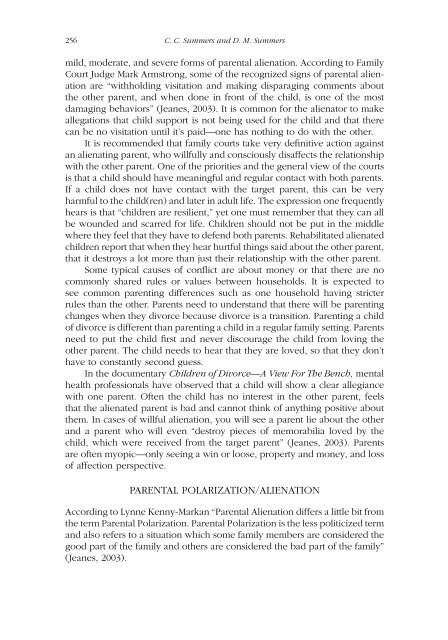Parentectomy in the Crossfire
Parentectomy in the Crossfire
Parentectomy in the Crossfire
Create successful ePaper yourself
Turn your PDF publications into a flip-book with our unique Google optimized e-Paper software.
256 C. C. Summers and D. M. Summers<br />
mild, moderate, and severe forms of parental alienation. Accord<strong>in</strong>g to Family<br />
Court Judge Mark Armstrong, some of <strong>the</strong> recognized signs of parental alienation<br />
are “withhold<strong>in</strong>g visitation and mak<strong>in</strong>g disparag<strong>in</strong>g comments about<br />
<strong>the</strong> o<strong>the</strong>r parent, and when done <strong>in</strong> front of <strong>the</strong> child, is one of <strong>the</strong> most<br />
damag<strong>in</strong>g behaviors” (Jeanes, 2003). It is common for <strong>the</strong> alienator to make<br />
allegations that child support is not be<strong>in</strong>g used for <strong>the</strong> child and that <strong>the</strong>re<br />
can be no visitation until it’s paid—one has noth<strong>in</strong>g to do with <strong>the</strong> o<strong>the</strong>r.<br />
It is recommended that family courts take very def<strong>in</strong>itive action aga<strong>in</strong>st<br />
an alienat<strong>in</strong>g parent, who willfully and consciously disaffects <strong>the</strong> relationship<br />
with <strong>the</strong> o<strong>the</strong>r parent. One of <strong>the</strong> priorities and <strong>the</strong> general view of <strong>the</strong> courts<br />
is that a child should have mean<strong>in</strong>gful and regular contact with both parents.<br />
If a child does not have contact with <strong>the</strong> target parent, this can be very<br />
harmful to <strong>the</strong> child(ren) and later <strong>in</strong> adult life. The expression one frequently<br />
hears is that “children are resilient,” yet one must remember that <strong>the</strong>y can all<br />
be wounded and scarred for life. Children should not be put <strong>in</strong> <strong>the</strong> middle<br />
where <strong>the</strong>y feel that <strong>the</strong>y have to defend both parents. Rehabilitated alienated<br />
children report that when <strong>the</strong>y hear hurtful th<strong>in</strong>gs said about <strong>the</strong> o<strong>the</strong>r parent,<br />
that it destroys a lot more than just <strong>the</strong>ir relationship with <strong>the</strong> o<strong>the</strong>r parent.<br />
Some typical causes of conflict are about money or that <strong>the</strong>re are no<br />
commonly shared rules or values between households. It is expected to<br />
see common parent<strong>in</strong>g differences such as one household hav<strong>in</strong>g stricter<br />
rules than <strong>the</strong> o<strong>the</strong>r. Parents need to understand that <strong>the</strong>re will be parent<strong>in</strong>g<br />
changes when <strong>the</strong>y divorce because divorce is a transition. Parent<strong>in</strong>g a child<br />
of divorce is different than parent<strong>in</strong>g a child <strong>in</strong> a regular family sett<strong>in</strong>g. Parents<br />
need to put <strong>the</strong> child first and never discourage <strong>the</strong> child from lov<strong>in</strong>g <strong>the</strong><br />
o<strong>the</strong>r parent. The child needs to hear that <strong>the</strong>y are loved, so that <strong>the</strong>y don’t<br />
have to constantly second guess.<br />
In <strong>the</strong> documentary Children of Divorce—AView For The Bench, mental<br />
health professionals have observed that a child will show a clear allegiance<br />
with one parent. Often <strong>the</strong> child has no <strong>in</strong>terest <strong>in</strong> <strong>the</strong> o<strong>the</strong>r parent, feels<br />
that <strong>the</strong> alienated parent is bad and cannot th<strong>in</strong>k of anyth<strong>in</strong>g positive about<br />
<strong>the</strong>m. In cases of willful alienation, you will see a parent lie about <strong>the</strong> o<strong>the</strong>r<br />
and a parent who will even “destroy pieces of memorabilia loved by <strong>the</strong><br />
child, which were received from <strong>the</strong> target parent” (Jeanes, 2003). Parents<br />
are often myopic—only see<strong>in</strong>g a w<strong>in</strong> or loose, property and money, and loss<br />
of affection perspective.<br />
PARENTAL POLARIZATION/ALIENATION<br />
Accord<strong>in</strong>g to Lynne Kenny-Markan “Parental Alienation differs a little bit from<br />
<strong>the</strong> term Parental Polarization. Parental Polarization is <strong>the</strong> less politicized term<br />
and also refers to a situation which some family members are considered <strong>the</strong><br />
good part of <strong>the</strong> family and o<strong>the</strong>rs are considered <strong>the</strong> bad part of <strong>the</strong> family”<br />
(Jeanes, 2003).


